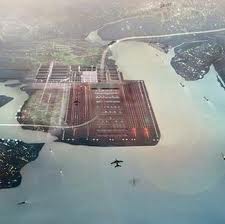 LONDON | The British prime minister David Cameron on Wednesday unilaterally gave his go-ahead to a closer study of the Thames Estuary airport proposal, among other options on expanding UK's travel and trade links with non-European markets. Downing Street explained that plans for a second runway at Stansted and any expansion of Gatwick before 2019 remained ruled out, as it is a third runaway for Heathrow airport.
LONDON | The British prime minister David Cameron on Wednesday unilaterally gave his go-ahead to a closer study of the Thames Estuary airport proposal, among other options on expanding UK's travel and trade links with non-European markets. Downing Street explained that plans for a second runway at Stansted and any expansion of Gatwick before 2019 remained ruled out, as it is a third runaway for Heathrow airport.
The Thames scheme has long been favoured by London's Mayor Boris Johnson, who has repeatedly assured there is keen interest from foreign sovereign wealth funds in investing in the project, and sees the new airport as a means to compete with the rest of Europe.
“You can’t go on expecting Britain to compete with France and Germany and other European countries when we simply can’t supply the flights to these growth destinations, China, Latin America,” Johnson told BBC Radio 4’s Today show. “We are being left badly behind.”
But BAA, operator of the six main UK airports including the largest, London Heathrow, reacted with a warning that it would be a wrong step to take.
The company, owned by the Spanish industrial firm Ferrovial, believes that the UK risks falling even further behind in coming years while the Thames Estuary option is brought to life instead of letting its current hub develop.
BAA Chief Executive, Colin Matthews, defended Heathrow's position:
“As the UK’s only international hub airport, Heathrow is central to developing our trade links with fast-growing emerging markets. Capacity constraints are damaging the UK economy today when the country can least afford it.
“A new hub airport has been proposed in the South East, but this has a projected cost of £50 billion and may take decades to build. During this time we would be handing over on a plate the UK's historic trade advantages to our European competitors.”
Speaking to the BBC, Mr Matthews said the new option would directly threaten Heathrow airport's standing:
“The consequences of closing Heathrow wouldn't just be big for my company. It would be big for 100,000 jobs in this part of London. It's a huge issue economically, a huge issue politically.”
BAA’s airports served 108.5 million passengers last year, an increase of 4.4%. There was also a record 476,197 flights, which represent 99.2% of Heathrow’s annual limit of 480,000, a figure that shows the pressure BAA is under to enhance the capability of its jewel airport in Britain.
At this early stage, Ferrovial's stock price was unaffected.




